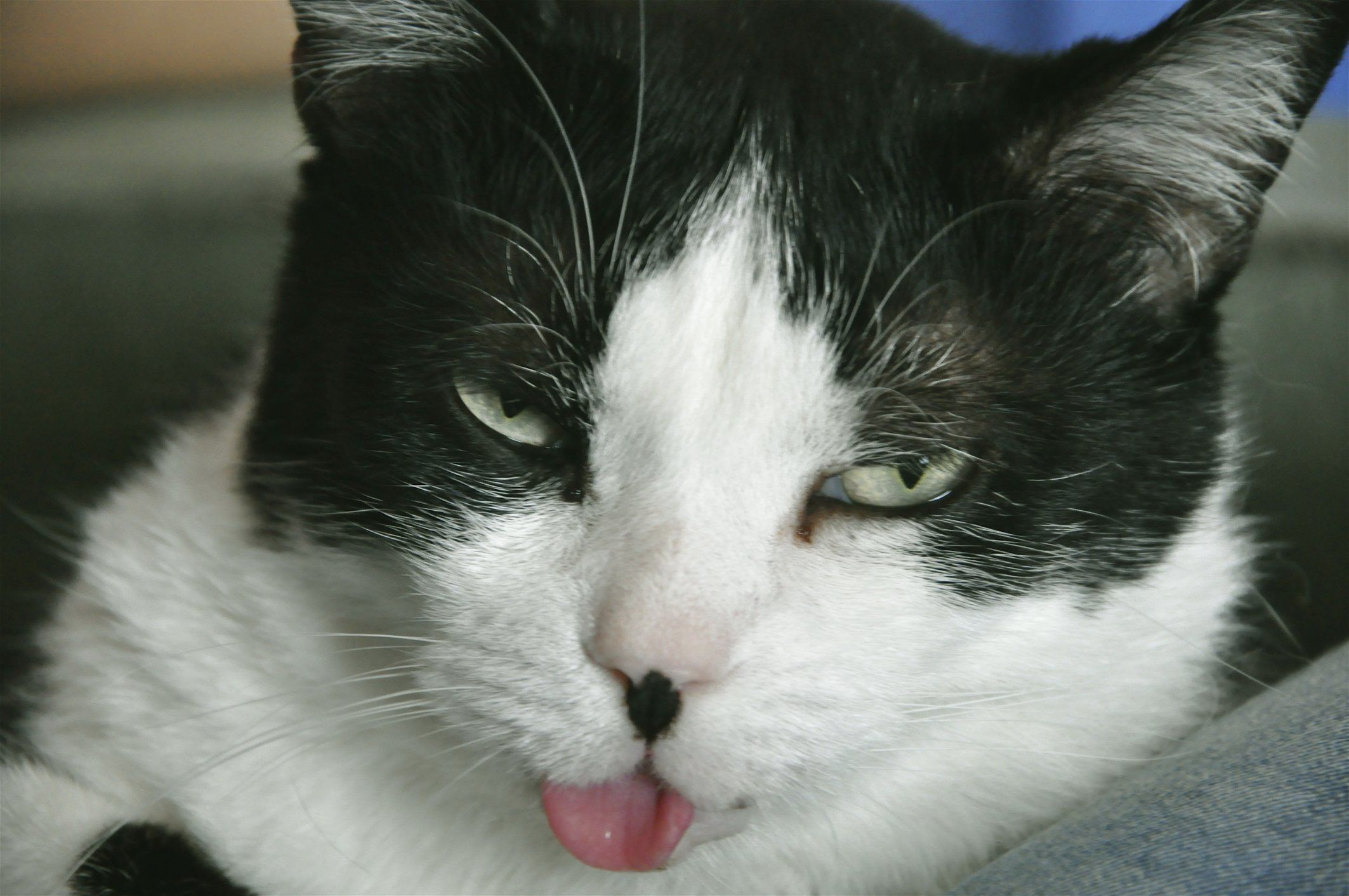It’s a sight that can be both amusing and slightly concerning for any cat owner: your feline companion sitting there, seemingly relaxed, with just the tip of their tongue peeking out. You might be wondering, “Why is my cat sticking its tongue out?” This common behavior in cats can stem from a variety of reasons, ranging from perfectly normal quirks to potential underlying health issues. Let’s explore the reasons behind this peculiar feline habit and when it might warrant a visit to the veterinarian.
 Cat sticking tongue out slightly, with a concerned yet endearing expression.
Cat sticking tongue out slightly, with a concerned yet endearing expression.
Is It Just a Harmless Cat Quirk?
For many cats, a little tongue protrusion is simply a harmless and endearing quirk. Just like humans have their unique habits, cats can develop their own little peculiarities. Sometimes, a cat’s tongue might just slip out when they are deeply relaxed or even asleep. In these instances, it’s often nothing more than a sign of contentment. You might notice it happening more often when your cat is purring, kneading, or in a state of blissful repose. Think of it as a feline version of absentmindedness – they’re so relaxed, they forget to fully retract their tongue!
When a Protruding Tongue Could Indicate a Health Issue
While often benign, a cat sticking its tongue out can also be a symptom of an underlying medical condition. It’s crucial to be aware of these potential issues so you can ensure your feline friend receives prompt and appropriate care.
Dental and Periodontal Disease
Oral health problems are a significant concern for cats, and periodontal disease is particularly prevalent. If your cat is experiencing discomfort or pain in their mouth due to dental issues, they might let their tongue loll out. Conditions like gingivitis (inflammation of the gums) and periodontitis (more advanced gum disease) can make it uncomfortable for a cat to fully close their mouth, leading to tongue protrusion. Other signs of dental disease to watch for include bad breath, drooling, difficulty eating, and pawing at the mouth. A thorough oral exam by a veterinarian, potentially including dental X-rays, is essential to diagnose and address these issues.
Stomatitis: Inflammation of the Mouth
Stomatitis, a severe inflammation affecting the entire mouth, can be extremely painful for cats. Cats with stomatitis may exhibit a range of symptoms, including excessive drooling, reluctance to eat hard food, pawing at their mouth, and, notably, sticking their tongue out. This condition often requires veterinary intervention, which may involve antibiotics, anti-inflammatory medications, and in severe cases, even tooth extraction.
Oral Tumors and Growths
Growths or tumors in the oral cavity can also cause a cat to stick its tongue out. These masses can physically obstruct the normal closure of the mouth or cause misalignment of the teeth and jaw. If you notice any unusual lumps, bumps, or swelling in your cat’s mouth, it’s imperative to seek veterinary attention promptly.
Trauma and Injuries
Trauma to the mouth, such as broken teeth, jaw fractures, or temporomandibular joint (TMJ) disorders, can lead to pain and an inability to close the mouth properly. This can result in the tongue protruding. If your cat has experienced any facial or oral trauma, or if you suspect an injury, a veterinary examination is crucial to assess the extent of the damage and provide appropriate treatment.
Kidney Disease and Uremia
Kidney failure is a common ailment, especially in older cats. Severe kidney disease can lead to a buildup of waste products in the blood, a condition known as uremia. Uremic cats can develop painful ulcers in their mouth, including on the gums, tongue, and lips. These oral ulcers can cause discomfort and lead to tongue protrusion. Other signs of kidney disease include increased thirst and urination, weight loss, and lethargy.
Feline Viral Infections
Certain viral infections, such as feline immunodeficiency virus (FIV) and feline calicivirus, can also cause oral ulcers in cats. These ulcers can be painful and contribute to a cat sticking its tongue out. If your cat displays other signs of illness alongside tongue protrusion, such as sneezing, coughing, or eye discharge, a viral infection could be a possibility.
What Should You Do If Your Cat Is Sticking Its Tongue Out?
While a fleeting tongue protrusion might be nothing to worry about, it’s always best to err on the side of caution when it comes to your cat’s health. If you notice your cat frequently sticking its tongue out, or if it’s accompanied by any other symptoms like drooling, bad breath, changes in appetite, or pawing at the face, it is recommended to schedule a veterinary checkup.
A veterinarian can perform a thorough oral examination to rule out any underlying dental disease, stomatitis, or other medical conditions. Early detection and treatment of any health issues are crucial for your cat’s well-being and comfort. In many cases, it might simply turn out to be a harmless quirk. But getting a professional opinion will provide peace of mind and ensure your feline companion is healthy and happy.


